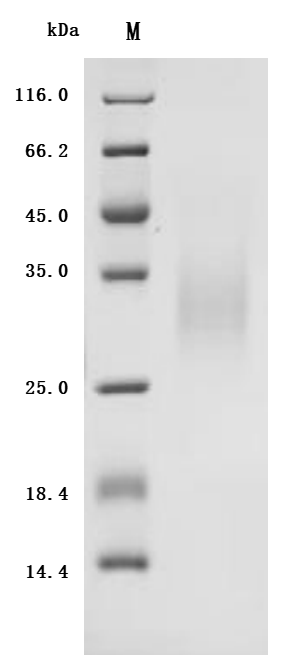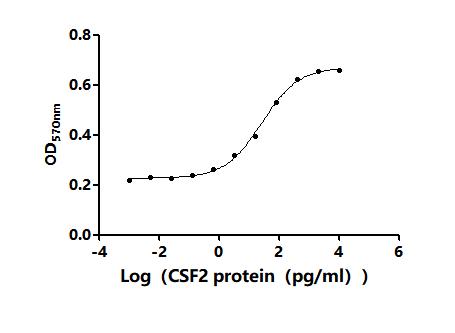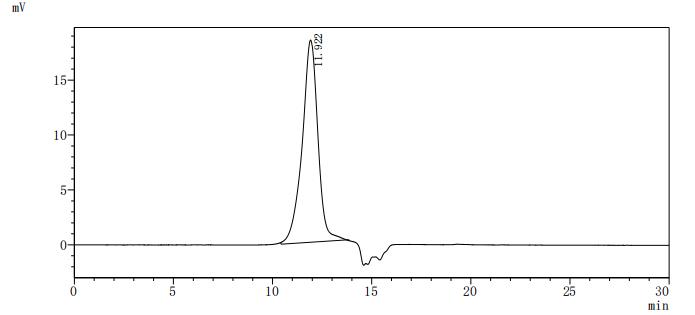The recombinant human CSF2 protein is produced using a yeast expression system. Its expression region corresponds to the amino acids 18 to 144 of the full-length mature human CSF2 protein. This recombinant human CSF2 protein is N-terminally tagged with a 6xHis-tag for easy detection and purification. It has a purity of over 95%, as confirmed by SDS-PAGE, and contains less than 1.0 EU/µg endotoxin, as determined by the LAL method. The recombinant CSF2 protein shows strong biological activity, with an ED50 value of 21.07-35.48 pg/mL, measured by its ability to stimulate the proliferation of human TF-1 cells in a dose-dependent manner.
Human CSF2 is a crucial cytokine produced by various cells, including macrophages, fibroblasts, and endothelial cells. It plays a multifaceted role in regulating hematopoiesis, immune response, and tissue repair. CSF2 stimulates the proliferation, differentiation, and survival of myeloid progenitor cells, which include granulocytes and monocytes, thereby influencing the immune system's capacity to respond to pathogens and inflammation [1][2]. CSF2 is also involved in tissue repair and regeneration. Studies have shown that CSF2 enhances the expression of extracellular matrix proteins and promotes keratinocyte proliferation, which is vital for wound healing. CSF2 has protective effects on embryonic development, as it can inhibit apoptosis in preimplantation embryos, suggesting its role in early developmental processes [3].
CSF2 acts through specific receptors, primarily the CSF2R, which activates several intracellular signaling pathways, including the JAK-STAT pathway, MAPK pathway, and PI3K-AKT pathway, which are critical for mediating the effects of CSF2 on cell proliferation, differentiation, and survival [1][4][5][6].
CSF2 is implicated in various pathological conditions, including inflammatory diseases and cancers. Its expression can be upregulated in response to inflammatory stimuli, leading to increased production of pro-inflammatory cytokines [7]. In the context of cancer, CSF2 can promote tumor cell survival and proliferation through its signaling pathways, making it a potential target for therapeutic intervention [1][7].
References:
[1] Z. Xu, Y. Zhang, M. Xu, X. Zheng, M. Lin, J. Pan, et al. Demethylation and Overexpression of CSF2 are Involved in Immune Response, Chemotherapy Resistance, and Poor Prognosis in Colorectal Cancer. Oncotargets and Therapy, vol. Volume 12, p. 11255-11269, 2019. https://doi.org/10.2147/ott.s216829
[2] Y. Ge, K. LaFiura, A. Dombkowski, Q. Chen, S. Payton, S. Buck, et al. The role of the proto-oncogene ets2 in acute megakaryocytic leukemia biology and therapy, Leukemia, vol. 22, no. 3, p. 521-529, 2007. https://doi.org/10.1038/sj.leu.2405066
[3] B. Loureiro, L. Oliveira, M. Favoreto, & P. Hansen. Colony-stimulating factor 2 inhibits induction of apoptosis in the bovine preimplantation embryo, American Journal of Reproductive Immunology, vol. 65, no. 6, p. 578-588, 2011. https://doi.org/10.1111/j.1600-0897.2010.00953.x
[4] M. Zhang, F. Liu, P. Zhou, Q. Wang, C. Xu, Y. Li, et al. The mtor signaling pathway regulates macrophage differentiation from mouse myeloid progenitors by inhibiting autophagy, Autophagy, vol. 15, no. 7, p. 1150-1162, 2019. https://doi.org/10.1080/15548627.2019.1578040
[5] L. Xiong, J. Cao, S. Chen, M. Wu, C. Wang, H. Xu, et al. Exploring the mechanism of action of xuanfei baidu granule (xfbd) in the treatment of covid-19 based on molecular docking and molecular dynamics, Frontiers in Cellular and Infection Microbiology, vol. 12, 2022. https://doi.org/10.3389/fcimb.2022.965273
[6] Y. Lee, W. Wu, C. Huang, C. Li, W. Li, B. Yeh, et al. Csf2 overexpression is associated with stat5 phosphorylation and poor prognosis in patients with urothelial carcinoma, Journal of Cancer, vol. 7, no. 6, p. 711-721, 2016. https://doi.org/10.7150/jca.14281
[7] X. He, L. Wang, H. Li, Y. Liu, C. Tong, C. Xie, et al. Csf2 upregulates cxcl3 expression in adipocytes to promote metastasis of breast cancer via the fak signaling pathway, Journal of Molecular Cell Biology, vol. 15, no. 4, 2023. https://doi.org/10.1093/jmcb/mjad025









